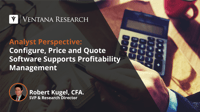Zoho recently held its annual analyst day to communicate its strategy, objectives and product roadmap. The privately held company, headquartered in Chennai, Tamil Nadu, India, has an unconventional approach to the software market. Its self-described corporate philosophy emphasizes making bold moves that challenge assumptions. Its design engineering approach stresses simplicity and cost while aiming to provide easy-to-use software with sufficient capabilities to improve personal and...
Read More
Topics:
Office of Finance,
Voice of the Customer,
Digital Commerce,
ERP and Continuous Accounting,
digital finance,
Customer Experience Management,
Generative AI,
Procure-to-Pay,
Order-to-Cash
FinancialForce offers cloud-based ERP and professional services automation (PSA) software. The company targets midsize and larger services companies, especially those that provide professional services (such as consultants or field service organizations) as well as those that offer subscription-based or recurring revenue services and products. FinancialForce’s key point of differentiation is that it is built natively on the Salesforce platform, ensuring that CRM data is already located on the...
Read More
Topics:
Office of Finance,
Business Planning,
Digital Commerce,
ERP and Continuous Accounting,
Subscription Management,
digital finance,
Revenue Management,
Revenue, Lease and Tax Accounting
General Omar Bradley is credited with saying, “Amateurs study strategy, professionals study logistics.” This is a battlefield commander’s perspective on the often-overlooked importance of mastering the nitty-gritty in achieving military objectives. I think the same is true when it comes to data in business computing because, in my experience, it is often an overlooked or secondary consideration.
Read More
Topics:
Office of Finance,
Digital Commerce,
ERP and Continuous Accounting,
digital finance
Pricing is an issue that almost every for-profit company confronts – and usually agonizes over. Chief financial officers must play a part in setting the strategic direction of pricing in their organization. They should not be involved in tactical pricing decisions because they are not close enough to markets and customers, but they should be part of the strategic design of pricing, especially as part of a profitability management effort, which I’ve discussed before.
Read More
Topics:
Office of Finance,
Analytics,
Financial Performance Management,
Digital Commerce,
Digital Business,
Revenue Management,
Sales Engagement
The annual Ventana Research Digital Innovation Awards showcase advances in the productivity and potential of business applications, as well as technology that contributes significantly to the improved processes and performance of an organization. Our goal is to recognize technology and vendors that have introduced noteworthy digital innovations to advance business and IT.
Read More
Topics:
Sales,
Office of Finance,
Digital Commerce,
ERP and Continuous Accounting,
Subscription Management
One of the oddities of corporate management is that, as a rule, nobody oversees managing profitability. CEOs are accountable for meeting company-wide financial targets and assign responsibility for achieving profitability levels to business unit owners across and down an organization. Sales quotas designed to achieve revenue goals are put in place, and budget owners have cost and margin objectives. But setting profitability objectives is not the same as managing profitability.
Read More
Topics:
Office of Finance,
Sales Performance Management (SPM),
Financial Performance Management,
Price and Revenue Management,
Digital Commerce,
Predictive Planning,
Subscription Management
One of the challenges of being a practically minded technology analyst is squaring the importance of “the next big thing” with the reality of what most organizations are doing. For decades it’s been the case that “the next big thing” in the world of information technology is easily several years ahead of where most organizations are in their use of technology. And before most organizations can realize the benefit of some whiz-bang technology, they frequently need to address a range of more...
Read More
Topics:
Human Capital Management,
Marketing,
Office of Finance,
Analytics,
Business Intelligence,
Sales Performance Management,
Financial Performance Management,
Price and Revenue Management,
Digital Marketing,
Work and Resource Management,
Digital Commerce,
Operations & Supply Chain,
Enterprise Resource Planning,
ERP and Continuous Accounting,
robotic finance,
Predictive Planning,
revenue and lease accounting,
Subscription Management,
intelligent sales,
AI & Machine Learning
In late February I attended Spark, the Scout annual user group meeting. This was the third and likely the last such meeting, as Scout was recently acquired by Workday. Scout’s users represent a new breed of purchasing managers and executives looking to change the role of the purchasing department. This change is critical for businesses. Saving money is the essential job of sourcing and purchasing departments. But departments can go far beyond that, helping support product and go-to-market...
Read More
Topics:
Office of Finance,
expense management,
Financial Performance Management,
Digital Technology,
Digital Commerce,
Operations & Supply Chain,
Enterprise Resource Planning,
ERP and Continuous Accounting,
purchasing,
sourcing
I’ve written before about blockchain’s significant potential. A lot of the current discussion on the topic centers on cryptocurrencies and financial trading platforms, both of which are already in operation. However, my focus is on its applicability to business generally, especially in B2B commerce, where I believe there is significant potential for it to serve as a universal data connector. There’s also a great deal of potential for blockchain to provide individuals with greater power in ...
Read More
Topics:
Sales,
Human Capital Management,
business intelligence,
Business Collaboration,
Internet of Things,
Data,
Product Information Management,
Digital Commerce,
Enterprise Resource Planning,
blockchain,
candidate engagement,
collaborative computing,
continuous supply chain
By itself, data isn’t useful for business; the application of analytics is necessary to transform data into actionable information. Data analysis of one sort or another has long been a core competence of finance departments, applied to balance sheets, income statements or cash flow statements. Today, however, Finance must go beyond these basics by expanding the scope of the data being examined to include all financial and operational information that can yield actionable insights. Analysis thus...
Read More
Topics:
Customer Experience,
Human Capital Management,
Marketing,
Voice of the Customer,
business intelligence,
embedded analytics,
Learning Management,
Analytics,
Collaboration,
Data Governance,
Data Lake,
Data Preparation,
Information Management,
Internet of Things,
Contact Center,
Data,
Product Information Management,
Sales Performance Management,
Workforce Management,
Financial Performance Management,
Price and Revenue Management,
Digital Technology,
Digital Marketing,
Digital Commerce,
ERP and Continuous Accounting,
blockchain,
natural language processing,
robotic finance,
Predictive Planning,
candidate engagement,
Intelligent CX,
Conversational Computing,
Continuous Payroll,
revenue and lease accounting,
collaborative computing,
mobile computing,
Subscription Management,
agent management,
extended reality,
AI & Machine Learning




















